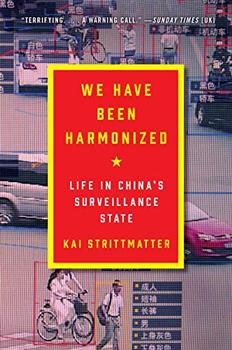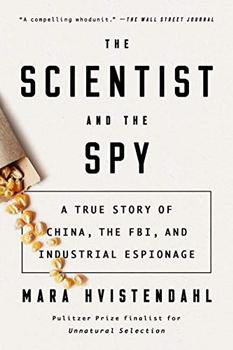Summary | Excerpt | Reviews | Beyond the book | Read-Alikes | Genres & Themes | Author Bio

A Prisoner, an SOS Letter, and the Hidden Cost of America's Cheap Goods
by Amelia PangIn 2012, Oregonian Julie Keith finally got around to opening a box of Halloween decorations purchased at Kmart a few years earlier. In addition to the inexpensive faux tombstones advertised on its exterior, she found the box contained a note claiming to be from someone in China imprisoned in the Masanjia Labor Camp. The note read in part: "People who work here have to work 15 hours a day with out Saturday, Sunday break and any holidays, otherwise, they will suffer torturement." It ended with a plea for help. Amelia Pang's debut, Made in China, uses the discovery of this missive as a starting point for an investigation into China's Laogai ("reform through labor") system. Her account includes Keith's discovery and the actions she took following it, details from the life of Sun Yi (the author of the note), and an exploration of how U.S. industries and lifestyles contribute to the perpetuation of forced labor in China.
The lion's share of the narrative focuses on Sun Yi, exploring his arrest, his experiences at Masanjia and his life after being released from the camp, which includes further harrowing events in and outside of China. It's this personal story highlighting the horrors of the Laogai system that has the most impact. The author also makes a point of letting her audience know that it's Americans' demand for cheap products produced ever more quickly that exacerbates the situation. She makes clear that to meet our desires, China has created a bigger pool of largely unpaid labor through arrests for minor offenses and increasing production quotas for those already incarcerated.
Pang's descriptions of how easy it is for a Chinese citizen to wind up in a labor camp are truly frightening; one man, for example, was sentenced to a year at Masanjia for premeditated robbery because he was reported with a fruit knife at a bus stop. She further describes the development of a high-tech predictive policing program that is used to identify suspicious people for arrest and the increasing use of facial recognition technology, which enhances the Chinese government's ability to crack down on even minor dissent.
Also enlightening is the author's depiction of how ubiquitous Chinese products are throughout the United States, and how challenging it is to monitor whether or not specific items are produced using forced labor. While researching her book in China, Pang followed trucks leaving a supposed detox center to their destinations — manufacturers who exported products such as rubber dog toys, electronics, brakes for bicycles and school supplies. She goes on to explain how the laws enacted by the U.S. prohibiting the import of items made with forced labor lack teeth, and how difficult it is for American companies to monitor the production of every element in their supply chain (it's expensive to fully audit the origin of all the electronics that go into a smartphone, for example). Often, when a specific camp is identified as problematic, the Chinese government simply moves or renames it; because the facility is technically no longer operational, any claims filed against it are subsequently dropped. The government also frequently denies a facility is a labor camp, instead claiming it's something innocuous, like a pretrial detention facility or a workshop for vocational training.
The book is fascinating and exceptionally well-written; it flies along almost at the clip of a novel and is eminently readable. It does, however, report the truly gruesome conditions within some of the forced labor camps, including sickeningly graphic descriptions of torture. The book's subject matter is important and the information Pang shares about these horrors is vital to understanding the problem, however, so hopefully most will be able to get beyond these scenes.
Often when I complete a book about the ills of the world and how I personally have contributed to them, I feel rather bad about myself. That's not the case here, though. The author's purpose isn't to beat up on her audience, but instead to raise awareness and encourage us to make small changes that may improve conditions for China's forced laborers. For instance, she recommends thinking twice before impulse buying — ask yourself if you already own something that serves the same purpose — and looking into an item's origins where possible. Just because something says it is made in America does not mean every part of it was manufactured in the United States. Her arguments are highly persuasive; I find myself constantly checking products before making a purchase, something that had never crossed my mind before reading the book. I think Sun's story is likely to resonate with many other readers, and few will remain unaffected by the account. I highly recommend Made in China for anyone interested in the subject, and it would also make a great choice for book groups.
![]() This review was originally published in The BookBrowse Review in February 2021, and has been updated for the
January 2022 edition.
Click here to go to this issue.
This review was originally published in The BookBrowse Review in February 2021, and has been updated for the
January 2022 edition.
Click here to go to this issue.

If you liked Made in China, try these:

by Kai Strittmatter
Published 2021
Hailed as a masterwork of reporting and analysis, and based on decades of research within China, We Have Been Harmonized, by award-winning correspondent Kai Strittmatter, offers a groundbreaking look at how the internet and high tech have allowed China to create the largest and most effective surveillance state in history.

by Mara Hvistendahl
Published 2021
A riveting true story of industrial espionage in which a Chinese-born scientist is pursued by the U.S. government for trying to steal trade secrets, by a finalist for the Pulitzer Prize in nonfiction.
Your guide toexceptional books
BookBrowse seeks out and recommends the best in contemporary fiction and nonfiction—books that not only engage and entertain but also deepen our understanding of ourselves and the world around us.